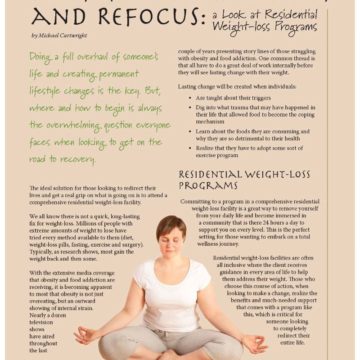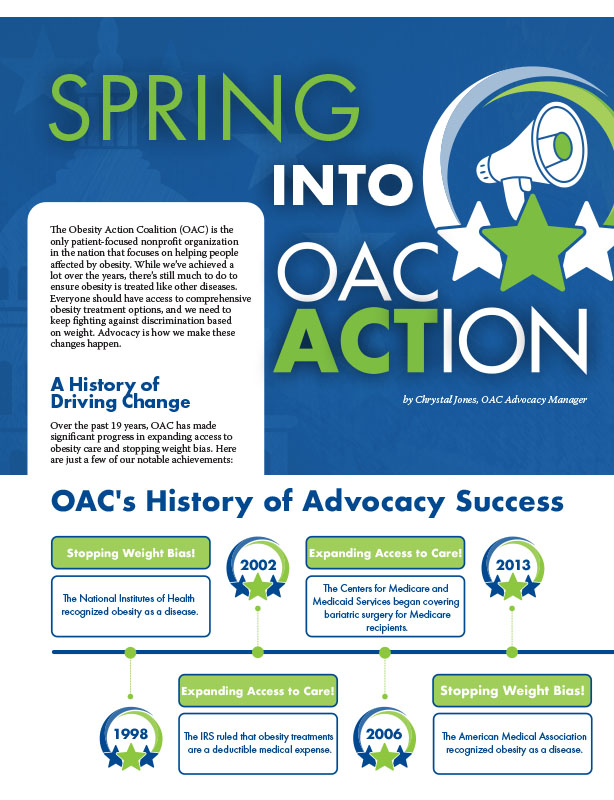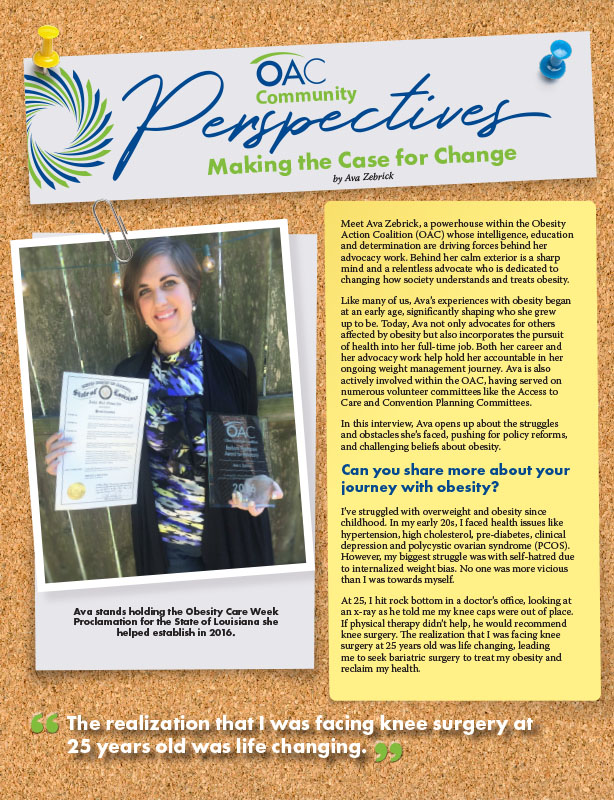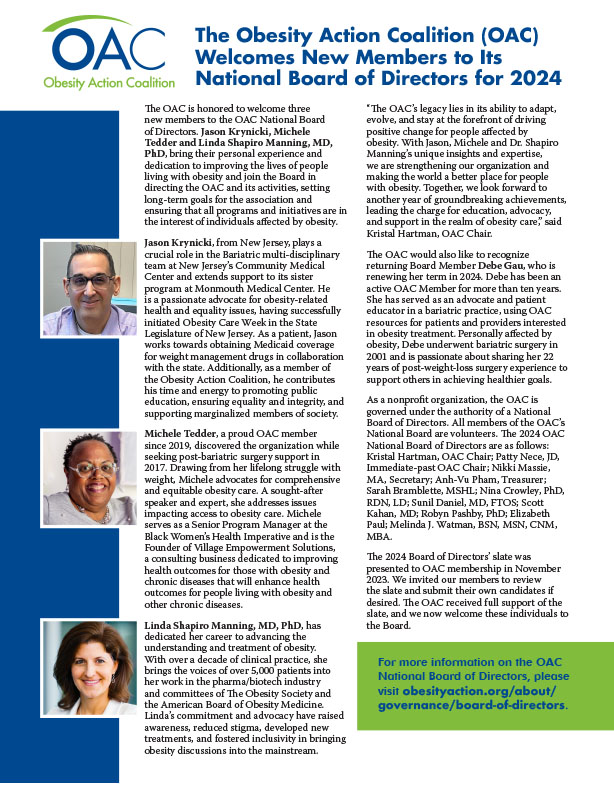Losing the Weight and Re-entering the Social Scene

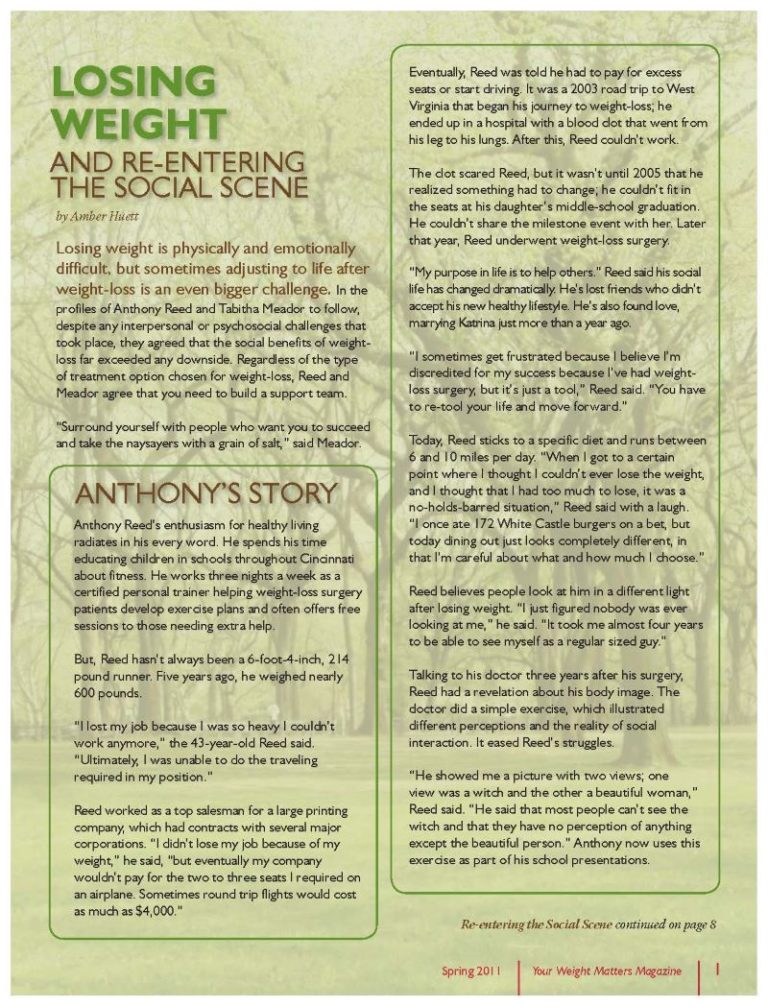
by Amber Huett
Spring 2011
Losing weight is physically and emotionally difficult, but sometimes adjusting to life after weight-loss is an even bigger challenge. In the profiles of Anthony Reed and Tabitha Meador to follow, despite any interpersonal or psychosocial challenges that took place, they agreed that the social benefits of weight-loss far exceeded any downside. Regardless of the type of treatment option chosen for weight-loss, Reed and Meador agree that you need to build a support team.
“Surround yourself with people who want you to succeed and take the naysayers with a grain of salt,” said Meador.
Anthony’s Story
Anthony Reed’s enthusiasm for healthy living radiates in his every word. He spends his time educating children in schools throughout Cincinnati about fitness. He works three nights a week as a certified personal trainer helping weight-loss surgery patients develop exercise plans and often offers free sessions to those needing extra help.But, Reed hasn’t always been a 6-foot-4-inch, 214 pound runner. Five years ago, he weighed nearly 600 pounds.
“I lost my job because I was so heavy I couldn’t work anymore,” the 43-year-old Reed said. “Ultimately, I was unable to do the traveling required in my position.” Reed worked as a top salesman for a large printing company, which had contracts with several major corporations. “I didn’t lose my job because of my weight,” he said, “but eventually my company wouldn’t pay for the two to three seats I required on an airplane. Sometimes round trip flights would cost as much as $4,000.”
Eventually, Reed was told he had to pay for excess seats or start driving. It was a 2003 road trip to West Virginia that began his journey to weight-loss; he ended up in a hospital with a blood clot that went from his leg to his lungs. After this, Reed couldn’t work. The clot scared Reed, but it wasn’t until 2005 that he realized something had to change; he couldn’t fit in the seats at his daughter’s middle-school graduation. He couldn’t share the milestone event with her. Later that year, Reed underwent weight-loss surgery.
“My purpose in life is to help others.” Reed said his social life has changed dramatically. He’s lost friends who didn’t accept his new healthy lifestyle. He’s also found love, marrying Katrina just more than a year ago. “I sometimes get frustrated because I believe I’m discredited for my success because I’ve had weight-loss surgery, but it’s just a tool,” Reed said. “You have to re-tool your life and move forward.”
Today, Reed sticks to a specific diet and runs between 6 and 10 miles per day. “When I got to a certain point where I thought I couldn’t ever lose the weight, and I thought that I had too much to lose, it was a no-holds-barred situation,” Reed said with a laugh. “I once ate 172 White Castle burgers on a bet, but today dining out just looks completely different, in that I’m careful about what and how much I choose.”
Reed believes people look at him in a different light after losing weight. “I just figured nobody was ever looking at me,” he said. “It took me almost four years to be able to see myself as a regular sized guy.” Talking to his doctor three years after his surgery, Reed had a revelation about his body image. The doctor did a simple exercise, which illustrated different perceptions and the reality of social interaction. It eased Reed’s struggles. “He showed me a picture with two views; one view was a witch and the other a beautiful woman,” Reed said. “He said that most people can’t see the witch and that they have no perception of anything except the beautiful person.” Anthony now uses this exercise as part of his school presentations.
From work, to mobility, loving openly, participating in his two daughters’ lives and going out dancing with his wife, Reed attests that life is good. “Some people think you’re someone else and have a hard time dealing with change, but you know,” he said. “I’m still the same person. I still have the same heart.”
The Experts on Interpersonal Changes
In the article, “Interpersonal Changes and Challenges after Weight-Loss Surgery,” Dr. Stephanie Sogg and Dr. Mark J. Gorman, psychologists at the Massachusetts General Hospital Weight Center and instructors in psychology at the Harvard University School of Medicine, recognize the inner dialogue struggle, but say that weight-loss and resulting life changes are “overwhelmingly positive.”
In social interactions, Drs. Sogg and Gorman say those who have lost weight assume that positive responses are “directly related to improved appearance,” but the reality is that the response is “partly attributable to changes to the way the patients interact with others. As their mood, self-confidence and self-esteem improve, patients may approach others more often and more positively, affecting a change in how others respond to them.” In other words, as people lose weight, they approach people more often and with a different attitude as well.
Tabitha’s Story
Tabitha Meador, a 27-year-old, self-proclaimed “farm girl” was always the “biggest and tallest” growing up in a small town in Illinois.The single gal has shed 150 pounds and now shops for single-digit sized jeans. “It’s been a big change in interacting with the opposite sex,” she said. “Before I lost the weight, I didn’t want anyone to touch me, but the more confident I was with my body the more I was open to getting close to people.”
Meador doesn’t make her weight-loss a secret, but has a policy: only discussing it if it comes up in natural conversation. “So many people don’t understand how much weight 150 pounds actually is, but at a certain point the number is beyond what most people can grasp,” Meador said. “Even I don’t recognize myself sometimes.”
By beginning with a slow, 30-minute walk, to her recent hobbies of jogging and fitness dance, Meador reached her weight in less than three years. “You really have to be ready to change your life,” she said. “Be patient, take small steps and let those little extra things add up.”
Socializing in the bar scene has been much easier as a slender version of herself, but Meador said she also feels more comfortable professionally. “When I’m at an interview or I’m discussing a topic that I’m well-versed in, I no longer worry about whether the person I’m talking to is listening,” she said. “Before, I felt like they were paying less attention to what I was saying; in many cases, silently judging me for my size.” Meador said she was surprised by people who befriended her only after she lost weight. “They were people I knew through church,” she said, “and people I had never suspected to be shallow.”
As someone interested in public policy, Tabitha thinks the best way to combat obesity is through education about labels, portion sizes and stricter regulations on the fast food industry.
New clothing, new confidence and more dates are all great, but Meador is most excited about comfort in travel. “Before I was worried about fitting in an airplane seat or crowding other people, but I actually took a picture of how much room I had on the plane on my last trip,” she said. “I can’t believe it some days, but it’s real.”
The Bottom Line
While weight-loss can sometimes disrupt the social dynamic of your family or friends, be sure that you communicate how you feel. If there are times when socializing creates stress, work on positive self-talk. Accept the good feelings about your health and image and reject the negative. Or as Reed or Meador might say, “I’m still me.”
About the Author:
Amber Huett is an OAC Advisory Board Member and a gastric-banding patient. She works for the State of Illinois, with experience in analyzing budgets, legislation and public health services. She is a graduate student at the University of Illinois-Springfield, earning her master’s degree in public administration. She has a bachelor’s degree in political science and journalism from Bradley University in Peoria, Illinois.
by Chrystal Jones, OAC Advocacy Manager Spring 2024 The Obesity Action Coalition (OAC) is the only patient-focused…
Read Articleby Ava Zebrick Spring 2024 Meet Ava Zebrick, a powerhouse within the Obesity Action Coalition (OAC) whose…
Read ArticleThe OAC is honored to welcome three new members to the OAC National Board of Directors. Jason Krynicki,…
Read Article





